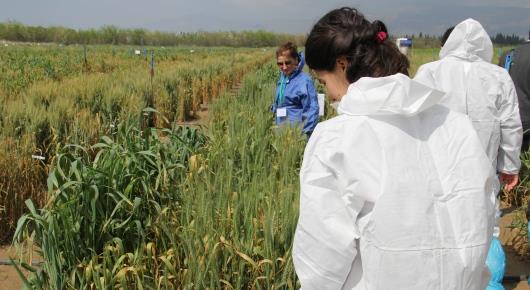Countries brace for a fight with wheat rust diseases

Crop specialists from ten countries of Central Asia, West Asia and the Near East will improve their ability to cope with destructive wheat rust diseases at a week-long workshop opening here today.
FAO, the International Center for Agricultural Research in the Dry Areas (ICARDA), the International Maize and Wheat Improvement Center (CIMMYT), and Aarhus University are joint organizers of the session.
The training is designed to help countries and international institutions closely monitor the occurrence of rusts, emergence of new races, and their movement across affected regions.
The three major rusts today are yellow rust, stem rust and leaf rust. These plant diseases are caused by air-borne fungi, whose spores can spread rapidly over long distances by wind. They infect the leaves, stems and ears of plants, resulting in shrivelled grains and yield losses of up to 80 percent, depending on local conditions.
Monitoring the disease is critical
“Monitoring is critical – especially in view of the possible spread of new races of stem rust and yellow rust identified in 2016, and the strategies needed to combat these emerging races,” said FAO plant pathologist Fazil Dusunceli. “Improving the skills of officers will better enable countries in the region to monitor the occurrence and movement of different races of rust in the region.”
Taking place from 18 to 23 April, the training builds on the successful outcomes of a 2016 workshop. It is supported by FAO and coordinated by ICARDA in collaboration with CIMMYT, Aarhus University, the Borlaug Global Rust Initiative (BGRI) and the General Directorate of Agricultural Research and Policies of Turkey. It is hosted by ICARDA at the Regional Cereal Rust Research Center.
“This training is the logical continuation of previous activities carried out by FAO in the subregion,” said Hafiz Muminjanov, FAO plant production and protection officer. “During the period 2011-2014, FAO provided technical support to the countries of Central Asia on conducting monitoring and surveillance of pests, diseases and weeds in cereal crops.
“The results of these studies were presented and discussed at regional workshops held in Almaty, Kazakhstan in 2012 and Izmir, Turkey in 2014. The studies also allowed us to develop guidelines for monitoring pests, diseases and weeds in cereal crops.”
More than 30 trainees from 10 countries
Hailing from Afghanistan, Azerbaijan, Iran, Kazakhstan, Kyrgyzstan, Lebanon, Russian Federation, Tajikistan, Tunisia and Turkey, more than 30 people are participating in this week’s training. Selected participants will continue with specialized practical training for an additional three weeks.
After the workshop, trainees will carry out surveys in their respective countries, and collect and send rust samples to Aarhus University for race analysis. This is intended to help with distribution mapping of emerging wheat rust races.
FAO’s contribution to the activity is also expected to strengthen the Regional Cereal Rust Research Center as an important resource in the management of wheat rust diseases in the region.
Race analysis carried out in 2016 by Aarhus University with support from FAO helped identify and track the movement of new rust races in Europe and Northern and Eastern Africa.
18 April, Izmir, Turkey
